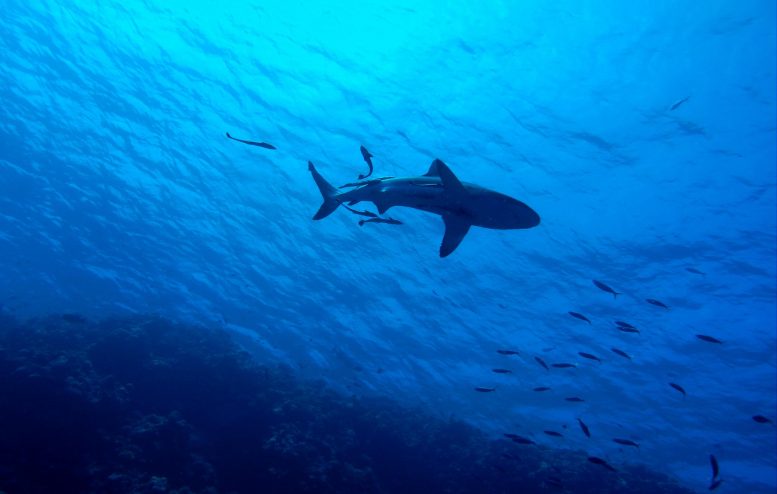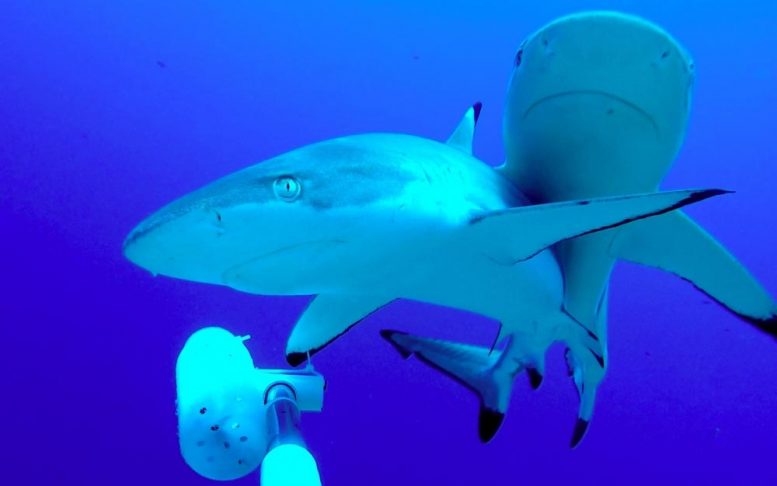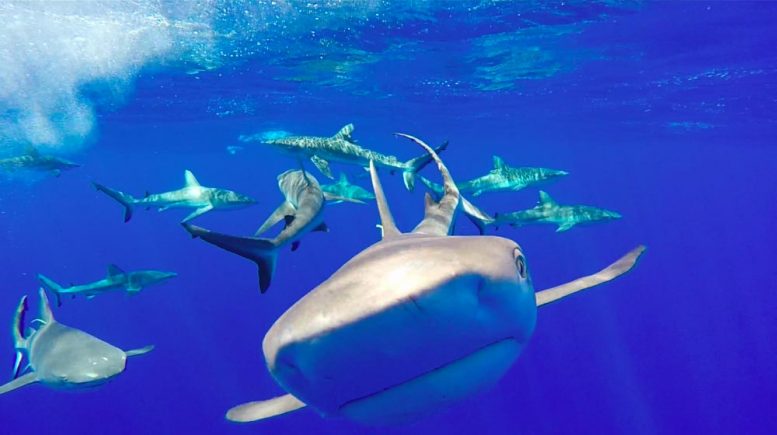
Sharks are vital to the health of the world’s oceans.
Global survey reveals sharks are functionally extinct on many of the world’s reefs, but hope lies in key conservation measures.
Though many people find them intimidating, menacing or just plain scary, sharks are vital to the health of the world’s oceans.
These often misunderstood creatures are found in just about every ocean habitat around the globe, but their populations are plummeting. Indeed, the true extent of their decline is not fully known.
To better understand the level of shark disappearance across tropical, coastal reefs, an international team of scientists, including researchers from UC Santa Barbara, conducted a landmark study under the Global FinPrint organization. Their findings, published in the journal Nature, reveal that sharks are virtually absent from many of the world’s coral reefs.

Reef sharks on Palmyra atoll inspect the baited remote underwater video system. Credit: Darcy Bradley
The results indicate that sharks are too rare to fulfill their normal role in these ecosystems — otherwise referred to as “functionally extinct.” Of the 371 reefs surveyed in 58 countries, sharks were not observed on nearly 20%, suggesting a widespread decline that has gone undocumented on this scale until now.
“Things aren’t good for sharks,” said coauthor Darcy Bradley, co-director of the Ocean and Fisheries Program at UC Santa Barbara’s Environmental Market Solutions Lab. Scientists have known this for a while, she added, but this study shows it in robust, empirical detail.
Essentially no sharks were detected on any of the reefs of six nations: The Dominican Republic, the French West Indies, Kenya, Vietnam, the Windward Dutch Antilles and Qatar. Among these, a total of only three sharks were observed on more than 800 survey hours.

A consortium of scientists studied a healthy population of grey reef sharks on Palmyra atoll. Credit: Darcy Bradley
Bradley and UCSB research biologist Jennifer Caselle conducted surveys at Palmyra Atoll, a small American territory smack in the center of the Pacific Ocean. Their contribution to the project was particularly important because the atoll is a protected area. The data they gathered helped to establish what a healthy shark population looks like. And since all of these surveys measure relative abundance, without baselines from pristine reefs like Palmyra, there’s no context for the data from other locations.
This first-ever benchmark for the status of reef sharks around the world, funded by the Paul G. Allen Family Foundation, reveals an alarming global loss of these iconic species that are important food resources, tourism attractions, and top predators on coral reefs. Their decline is due in large part to overfishing of sharks and their prey, with the single largest contributor being destructive fishing practices, such as the use of longlines and gillnets.
“Although our study shows substantial negative human impacts on reef shark populations, it’s clear the central problem exists in the intersection between high human population densities, destructive fishing practices, and poor governance,” said Demian Chapman, Global FinPrint co-lead and associate professor at Florida International University. “We found that robust shark populations can exist alongside people when those people have the will, the means, and a plan to take conservation action.”

Darcy Bradley and Jenn Caselle. Credit: Sonia Fernandez
The study revealed several countries where shark conservation is working and the specific actions that seem promising. The best performing nations, in comparison to the average of their region, included Australia, the Bahamas, the Federated States of Micronesia, French Polynesia, the Maldives, and the United States.
These nations reflect key attributes that were found to be associated with higher populations of sharks. They are generally well-governed, and either ban all shark fishing or have strong, science-based management limiting how many sharks can be caught.
“These nations are seeing more sharks in their waters because they have demonstrated good governance on this issue,” said Aaron MacNeil, lead author of the Global FinPrint study and associate professor at Dalhousie University. “From restricting certain gear types and setting catch limits, to national-scale bans on catches and trade, we now have a clear picture of what can be done to limit catches of reef sharks throughout the tropics.”
The FinPrint team is wrestling with the fact that conservation action on sharks alone can only go so far. Researchers are now looking at whether recovery of shark populations requires management of the wider ecosystem to ensure there are enough reef fish to feed these predators.
“Now that the survey is complete, we are also investigating how the loss of sharks can destabilize reef ecosystems,” said Mike Heithaus, Global FinPrint co-lead and dean of the College of Arts, Sciences & Education at Florida International University. “At a time when corals are struggling to survive in a changing climate, losing reef sharks could have dire long-term consequences for entire reef systems.”
Launched in the summer of 2015, Global FinPrint’s data were generated from baited remote underwater video stations (BRUVS). These consist of a video camera placed in front of a standard amount of bait — a “Chum Cam.” Standardizing the BRUVs across all the sites made data much easier to compare between locations. Coral reef ecosystems were surveyed in four key geographic regions across the tropics: the Indo-Pacific, Pacific, the Western Atlantic, and the Western Indian Ocean.
Over the course of four years, the team captured and analyzed more than 15,000 hours of video from surveys of 371 reefs in 58 countries, states, and territories around the world. The work was conducted by hundreds of scientists, researchers, and conservationists organized by a network of collaborators from Florida International University, the Australian Institute of Marine Science, Curtin University, Dalhousie University, and James Cook University.
“This work doesn’t just document the demise of sharks,” said UC Santa Barbara’s Caselle. “It provides hope, and more importantly, it provides actionable solutions that countries can follow to protect and rebuild their shark populations.”
Reference: “Global status and conservation potential of reef sharks” by M. Aaron MacNeil, Demian D. Chapman, Michelle Heupel, Colin A. Simpfendorfer, Michael Heithaus, Mark Meekan, Euan Harvey, Jordan Goetze, Jeremy Kiszka, Mark E. Bond, Leanne M. Currey-Randall, Conrad W. Speed, C. Samantha Sherman, Matthew J. Rees, Vinay Udyawer, Kathryn I. Flowers, Gina Clementi, Jasmine Valentin-Albanese, Taylor Gorham, M. Shiham Adam, Khadeeja Ali, Fabián Pina-Amargós, Jorge A. Angulo-Valdés, Jacob Asher, Laura García Barcia, Océane Beaufort, Cecilie Benjamin, Anthony T. F. Bernard, Michael L. Berumen, Stacy Bierwagen, Erika Bonnema, Rosalind M. K. Bown, Darcey Bradley, Edd Brooks, J. Jed Brown, Dayne Buddo, Patrick Burke, Camila Cáceres, Diego Cardeñosa, Jeffrey C. Carrier, Jennifer E. Caselle, Venkatesh Charloo, Thomas Claverie, Eric Clua, Jesse E. M. Cochran, Neil Cook, Jessica Cramp, Brooke D’Alberto, Martin de Graaf, Mareike Dornhege, Andy Estep, Lanya Fanovich, Naomi F. Farabough, Daniel Fernando, Anna L. Flam, Camilla Floros, Virginia Fourqurean, Ricardo Garla, Kirk Gastrich, Lachlan George, Rory Graham, Tristan Guttridge, Royale S. Hardenstine, Stephen Heck, Aaron C. Henderson, Heidi Hertler, Robert Hueter, Mohini Johnson, Stacy Jupiter, Devanshi Kasana, Steven T. Kessel, Benedict Kiilu, Taratu Kirata, Baraka Kuguru, Fabian Kyne, Tim Langlois, Elodie J. I. Lédée, Steve Lindfield, Andrea Luna-Acosta, Jade Maggs, B. Mabel Manjaji-Matsumoto, Andrea Marshall, Philip Matich, Erin McCombs, Dianne McLean, Llewelyn Meggs, Stephen Moore, Sushmita Mukherji, Ryan Murray, Muslimin Kaimuddin, Stephen J. Newman, Josep Nogués, Clay Obota, Owen O’Shea, Kennedy Osuka, Yannis P. Papastamatiou, Nishan Perera, Bradley Peterson, Alessandro Ponzo, Andhika Prasetyo, L. M. Sjamsul Quamar, Jessica Quinlan, Alexei Ruiz-Abierno, Enric Sala, Melita Samoilys, Michelle Schärer-Umpierre, Audrey Schlaff, Nikola Simpson, Adam N. H. Smith, Lauren Sparks, Akshay Tanna, Rubén Torres, Michael J. Travers, Maurits van Zinnicq Bergmann, Laurent Vigliola, Juney Ward, Alexandra M. Watts, Colin Wen, Elizabeth Whitman, Aaron J. Wirsing, Aljoscha Wothke, Esteban Zarza-Gonzâlez and Joshua E. Cinner, 22 July 2020, Nature.
DOI: 10.1038/s41586-020-2519-y









Be the first to comment on "Reef Sharks in Decline – Already Functionally Extinct on Many of the World’s Reefs"